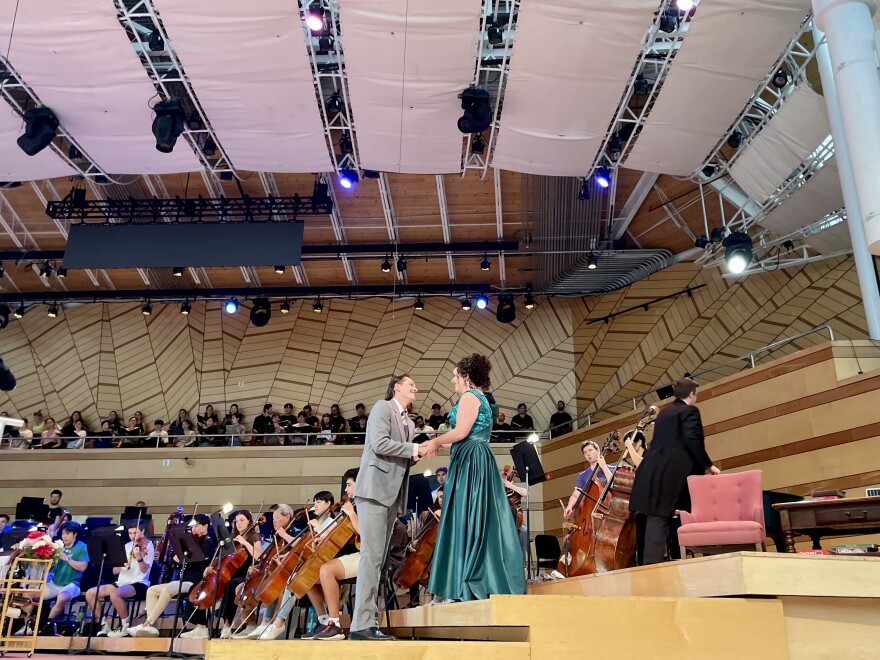To write a novel that reads like an opera, author Ann Patchett had to do her research. She wanted to explore melodrama — and what form is more melodramatic than the opera? — so as she developed the book “Bel Canto,” she listened to as much of the music as she could.
“What if melodrama isn't a bad term? Maybe it's something to be celebrated or dug into,” Patchett said. “So when I was writing the book, I was trying to have a kind of operatic pitch to it.”
Patchett’s book is the fictionalized retelling of real events, when a group of guerilla fighters took a party of dignitaries in Peru hostage for 126 days in 1996.
In her rendition, that party includes a renowned opera singer named Roxanne Coss. And Coss sings many of the same arias as Renée Fleming — a very real and very famous American soprano who became inextricably linked to the lore of “Bel Canto.”
“The book came out [in 2001] and people who knew about opera all thought it was a book about Renée,” Patchett said. “Then Renée and I met and we became friends, and so many people have said that it was a book about Renée that at this point, Renée and I were both like, ‘Yeah, yeah, sure, right. Yes, it was.’”
Fleming is now the co-artistic director for the Aspen Opera Theater and VocalARTS program at the Aspen Music Festival and School, which is staging the opera version of “Bel Canto” on Friday night at the Benedict Music Tent.
And with time, Fleming has become part and parcel of the history of “Bel Canto” — both as inspiration for the novel and someone who helped develop the opera version commissioned by the Lyric Opera of Chicago.
As a creative consultant for the Lyric Opera, Fleming was the one who proposed the adaptation project and curated the creative team, which included composer Jimmy López Bellido and playwright Nilo Cruz.
When the opera debuted in 2015, it was a hit — and for good reason, too, Fleming said.
“Some of the strife and some of the situations that one finds really all over the world right now, it's still very relevant,” Fleming said. “But Ann’s novels all ultimately find the humanity in people and they rise to the occasion. In this case, it's through the power of art.”
The director, Kevin Newbury, agrees.
“Music is the common language that brings all these characters together,” he said.
Newbury also directed the opera’s 2015 Chicago debut, which was later adapted into an television episode of the PBS program “Great Performances.”
And even though the opera is based on a 1996 event that inspired a 2001 novel, Newbury believes the story might resonate more now, in 2023.
“Let's face it, we're all having a hard time understanding each other in this country,” Newbury said. “And we're coming out of the most seismic shift in how our species communicates in our lifetime. And this is an opera about finding common ground about listening to the other side.”
The opera features 16 different principal roles, singing in nine different languages, which translates to “so much representation in terms of race, ethnicity, and background” on the stage, Newbury said.
“I think it's what audiences are craving now, … to see the world that we're living in right now reflected on stage,” he said.
Newbury has spent most of his career focused on modern works, rather than revisiting the classics.
“An artist's job is to reflect the times that we live in,” Newbury said. “And I enjoy redefining and revisiting some of the classics from time to time, but I want to be a part of the next generation. What does the future of our art form look like?”
To Patrick Summers, who runs the festival’s Aspen Opera Theater and VocalARTS program with Fleming, the future of opera looks a lot like “Bel Canto.”
Summers said it’s “a new way of experiencing this art form” — contemporary, theatrical, suspenseful, all in a way that helps bring more people (and more new people) into the theater.
“Bel Canto is an extraordinary opera,” Summers said. “It is harrowing, but it is harrowing in an extraordinarily cathartic way, so even for first-time opera audiences it is a really amazing experience. This is not your grandmother's opera.”
But it also kind of is your grandmother’s opera — or, rather, your great-great-great grandma’s opera.
“I think in some ways, opera is kind of returning to its roots,” Summers said. “You know, it started as an art form that used existing stories that the audience could connect with, told them in new ways. … Opera is doing that, again, with stories that are contemporary and are known in contemporary ways, and so composers are taking back opera for audiences.”
“Bel Canto” is a one-night-only performance at the Benedict Music Tent. It starts at 7 p.m. Friday night, with tickets ranging from $20 to $50. Audiences should be advised that the production uses imitation gun props and simulated gunshot sounds.
Classical music correspondent Chris Mohr contributed interviews to this story.




